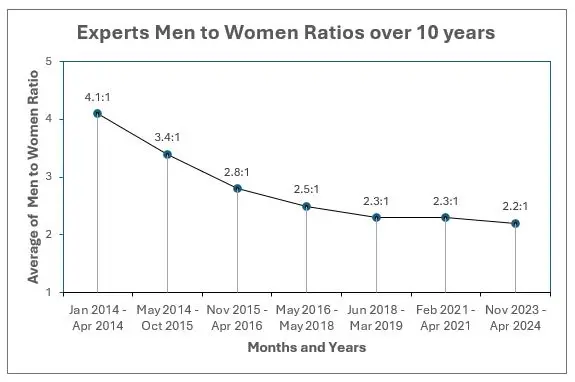
Double the number of men are being quoted as experts compared to women on the UK’s biggest broadcast news programmes, according to a new survey into gender inequality.
However, ten years ago there were four times as many male experts on air compared to women.
Across BBC News at Ten, BBC Radio 4’s Today programme, ITV News at Ten, Sky News Breakfast, Channel 4 News and Channel 5 News between November and April, there was on average 1.97 men for every one woman expert featured.
This is an improvement from the start of 2014 when there were 4.1 male experts for every one woman featured.
The new figures have been published by City St Georges (part of the University if London) following the latest study led by Professor Emerita Lis Howell, director of the Expert Women Project, and Professor Suzanne Franks, Professor of Journalism.

Howell told Press Gazette the increase in women experts may be attributed in part to an increase in equality in other professional areas as well as increased efforts being undertaken by the broadcast programmes.
Some of the broadcasters also produce their own internal data on diversity in their output – for example the BBC’s 50:50 Project.
The programmes included were chosen because they were described as “flagship” shows when the research began ten years ago.
Researchers monitored each programme every weekday for one week in every month between November and April in this latest period.
Anyone interviewed because of their knowledge, influence or authority – including politicians, CEOs, academics and celebrities – were classed as “experts” for the research.
Howell acknowledged that the presence of men or women can depend on the stories in the news agenda and the gender diversity of senior politicians, for example, but suggested it should ultimately balance out.
During the Covid-19 pandemic, for example, one month featured an “outstandingly high number of women experts” including NHS workers and care home managers, resulting in the highest recorded ratio of women experts on air in March 2021 (1.6 men for one woman). But Howell said the next month was disproportionately dominated by male politicians.
Referring to the war in Israel and Gaza which began just before the latest research period, Howell added: “We’re in a war situation now. Perhaps that’s the reason why it’s slightly stalled, because… we’ve got wonderful women war reporters, but the experts that they interview tend to be men because war is promulgated by men largely.”
The most equal ratio was at Channel 5 News where 1.5 male experts were featured for every one female. The 5 News gender split in terms of the on-air time for presenters was skewed by the fact that the show has one main presenter, Dan Walker, who is a man.
On the other end of the table, BBC News at Ten had more women presenters on screen than men (a 0.6 to one male to female ratio). The study took place while former BBC lead anchor Huw Edwards was suspended and off-air.
On average across the programmes surveyed there were 1.36 men to every one woman correspondent or reporter.
Howell said she is "disappointed personally" that there were not more women reporters but acknowledged there are "far more women in newsrooms than there was before".
"It should be one to one, and 1.36 doesn't sound as if it's a lot out, but it is out."
In 2014, excluding Channel 5, there were an average of 3.02 men to every one woman reporter/correspondent.
Howell added: "I do think there's a tendency to think that men go and get their hands dirty and do the hunting and gathering and women sit in the studio with their hair done, and that's unfair on both sides. We need to see more women on the road, especially see more women do broadcast journalism courses and things like that."
Email pged@pressgazette.co.uk to point out mistakes, provide story tips or send in a letter for publication on our "Letters Page" blog
